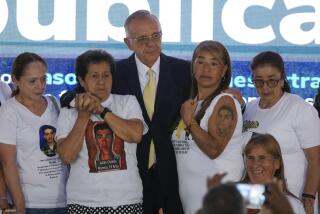U.S. Praises Salvador Action in Jesuit Case
- Share via
WASHINGTON — The Bush Administration praised El Salvador on Monday for admitting military involvement in the recent slayings of six Jesuit priests, but members of Congress suggested that continued U.S. military support for the tiny Central American nation might be in jeopardy unless the killers are punished.
White House Press Secretary Marlin Fitzwater said that Salvadoran President Alfredo Cristiani had shown “great courage” in announcing Sunday night that the preliminary investigation into the killings had implicated his own military.
“We asked that the investigation be thorough and the prosecution move ahead, and it looks like that is the course he (Cristiani) is on. He deserves a lot of credit,” Fitzwater told reporters traveling with President Bush to Orlando, Fla.
At the State Department, spokeswoman Margaret Tutwiler called the findings an “important breakthrough” that “puts to rest” widespread speculation, especially among congressional skeptics, that the Salvadoran government would never blame its own powerful military establishment.
The slain priests, all members of the faculty of the Jesuit-run Central American University in El Salvador’s capital city, were taken from their beds at the university residence before dawn Nov. 16 and shot to death with automatic weapons. Also slain was the priests’ housekeeper and her 15-year-old daughter.
Progress in solving the brutal killings appeared crucial to whether Congress would continue sending military aid to the Cristiani government, which currently receives more than $300 million a year in U.S. assistance. Cristiani’s announcement marked the first time that a Salvadoran president has blamed the military for a so-called “death squad” murder.
Although Congress is in recess until Jan. 23, several lawmakers likely to play key roles in the debate over aid to El Salvador offered only qualified praise for Cristiani’s announcement. They said they will withhold judgment until the perpetrators of the crime are identified, arrested and punished.
“I have told President Cristiani that there will be a major crisis in U.S.-Salvadoran relations unless this investigation is carried out completely, regardless of where it leads,” said Sen. Patrick J. Leahy (D-Vt.), chairman of the Senate Appropriations subcommittee on foreign operations.
Leahy added that he will continue to press in the Senate for a strong link between U.S. aid and respect for human rights in El Salvador.
“The overall human rights situation there is appalling,” he said, “and the United States has an obligation to use its enormous influence through its aid program to insist on concrete improvements in human rights by the Salvadoran government, the armed forces and the police.”
Sen. Edward M. Kennedy (D-Mass.), one of the most vocal critics of El Salvador in the Senate, called Cristiani’s admission “a long-overdue but welcome step toward justice in this brutal killing.”
However, Kennedy said the “key issue” remains Cristiani’s progress in “identifying the responsible individuals . . . and bringing them to justice, regardless of their rank. There must be no further cover-up.”
Rep. David E. Bonior (D-Mich.) insisted that Cristiani has “to pursue the case all the way to the top, to those who pulled the trigger and those who ordered it.” U.S. aid to El Salvador, he added, “hangs in the balance.”
Congress’ skepticism reflects the fact that, although thousands of people have been killed over the past decade by suspected right-wing death squads connected directly or indirectly to the military, no Salvadoran military officer has ever been convicted of murder in such a case.
The greatest number of right-wing death-squad killings occurred during the early years of the Salvadoran civil war, which began in early 1980. When Cristiani’s right-wing administration was elected to office last year, it was feared there could be a major resurgence of death squad activity, with leftist civilians as the targets.
And while Cristiani’s government managed initially to keep that from happening, renewed terrorism by left-wing guerrillas touched off a fresh spiral of politically motivated slayings, including the killing of the six priests.
Widely assumed to have been the work of military men stationed near the university campus at that time, the killings provoked outrage in Congress and led to new demands for a suspension of U.S. aid.
Tutwiler, the State Department spokeswoman, said the admission of military involvement in the slayings should not affect U.S. support for Cristiani’s elected government in its war against the Marxist-led guerrillas. But mindful of the strong sentiment on Capitol Hill, she stressed that it is crucial that Cristiani “now take actions to prosecute the alleged individuals.”
Staff writers Norman Kempster and James Gerstenzang contributed to this story.
More to Read
Sign up for Essential California
The most important California stories and recommendations in your inbox every morning.
You may occasionally receive promotional content from the Los Angeles Times.













